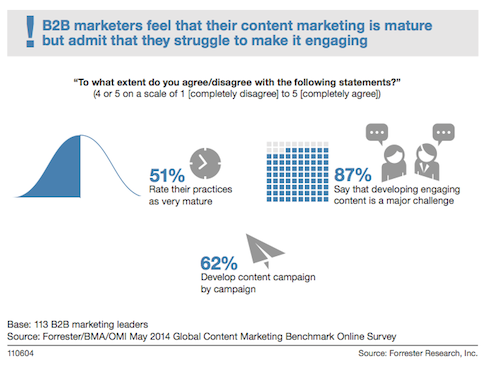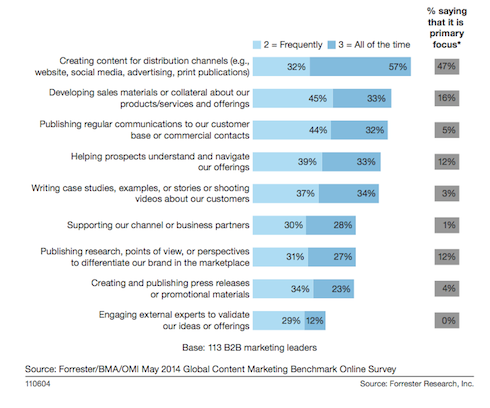Incite Group is now Reuters Events - LEARN MORE
By adaptive - July 22nd, 2014
Content is still king across social media. New research however, suggests that B2B marketers are still struggling to convert the content they produce into tangible revenue
Across the board corporations have been increasing their creation of new content especially for the social media channels their enterprises support. It is clearly understood that well-crafted content will reach its audience. However, new insights from Forrester indicate that these efforts are often not delivering the results corporations need or expect.
Says Business Marketing Association Chair Steve Liguori: “The majority of marketers find producing content that engages buyers to be a major challenge. And that’s for good reason. Our survey results show that the majority of B2B content practices focus too narrowly on early-stage buyer acquisition — which fails to engage buyers throughout their lifetime. To create content that attracts and builds customer relationships throughout the customer life cycle, B2B marketers must make a fundamental shift from writing about features and benefits to delivering valuable information that drives business results.”
According to the 2014 Forrester Research/Business Marketing Association/Online Marketing Institute study, ‘Compare Your B2B Content Marketing Maturity’, while 51% of B2B marketing leaders rate their content marketing practices as very mature, an overwhelming 85% fail to connect content activity to business value — and, as a result, fail to retain customers or win their long-term loyalty. In fact, when asked to look back at the past 12 months and rate the effectiveness of content marketing efforts, only 14% of those surveyed gave their content practices high marks for delivering value back to the business.
Converting content
B2B marketers have more work to do when it comes to using content to consistently deliver a valuable exchange of information with prospective buyers. To start, too many marketers continue to downplay the importance of content as marketing’s main job. A startling 72% of surveyed marketers say less than half of their marketing staff plays a primary role in content marketing today — leaving content to quickly degrade to talk of products, features, and what the company has to offer, rather than cleverly packaged bits of the interesting insights buyers crave.
“The gap between content marketing awareness and good content marketing execution is not surprising. It's something we run into every day at the Institute — what we call the digital skills gap,” said Online Marketing Institute Founder and CEO Aaron Kahlow. “There simply aren't enough trained content marketers to do the legwork. But the imperative for education is here and seen across the board, from entry level to CMO.”
Forrester point to three key activities that prevent content marketing producing the expected results:
- Focus on producing content simply to fill channels.
Our survey shows just how narrowly marketers’ content efforts centre on outbound campaigns that tell buyers what they should buy. Sixty-two per cent admit to producing content on a campaign-by-campaign basis, a practice that fails to address how buyers experience this content over time.
- Downplay the importance of content as marketing’s main job.
At its core, marketing is about communication, and content is the principal way that marketers communicate to the market.
- Struggle to link content activity to business value.
While almost all marketers say that content marketing is important, an overwhelming 85% admit that it is only somewhat effective — or less so — at moving the needle on generating revenue, retaining customers, or winning customers’ long-term loyalty.
The results that Forrester gathered reveals that content is being targeted at a wide range of channels including social media. The problem isn’t that content is not being produced, but that the content is not engaging with its audience, as they often don’t see it as valuable. This is often because the content has been produced simply as a marketing or ad tool, when content marketing is benefit driven – especially across the social media space.
“Business buyers can now access an abundance of digital information to research and shop for solutions on their own terms,” said Forrester Research Vice President and Principal Analyst Laura Ramos. “That means many B2B firms risk losing more empowered customers to more responsive competitors — if they don’t take the time to assess the true maturity of their content marketing engines and make sure that content connects with what concerns and interests buyers.”
The good news, says Ramos is “Once marketing leaders have made the shift to relationship-building content marketing, they will find that it regularly fuels the demand generation engine, boosts brand visibility, and attracts buyers interested in the problems their company can solve.”
What this report makes abundantly clear is that there is still a misunderstanding when content creation is placed in a marketing context.
Often corporate marketers will simply apply ad metrics to their content that simply does not engage with its intended audience. Why? Content marketing in an age dominated by social media means content must offer value and not simply marketing messages.
Corporations that can understand this and produce world-class content that supports their customers’ buying journey will see brand advocacy rocket along with massive improvements in ROI.
Image Source: Freedigitalphotos.net
Next Reads
September 2014, San Francisco
Use social to get closer to your customer. The Corporate Social Media Summit is your one-stop-shop for all the latest social media insight and best practice.
Brochure Programme


